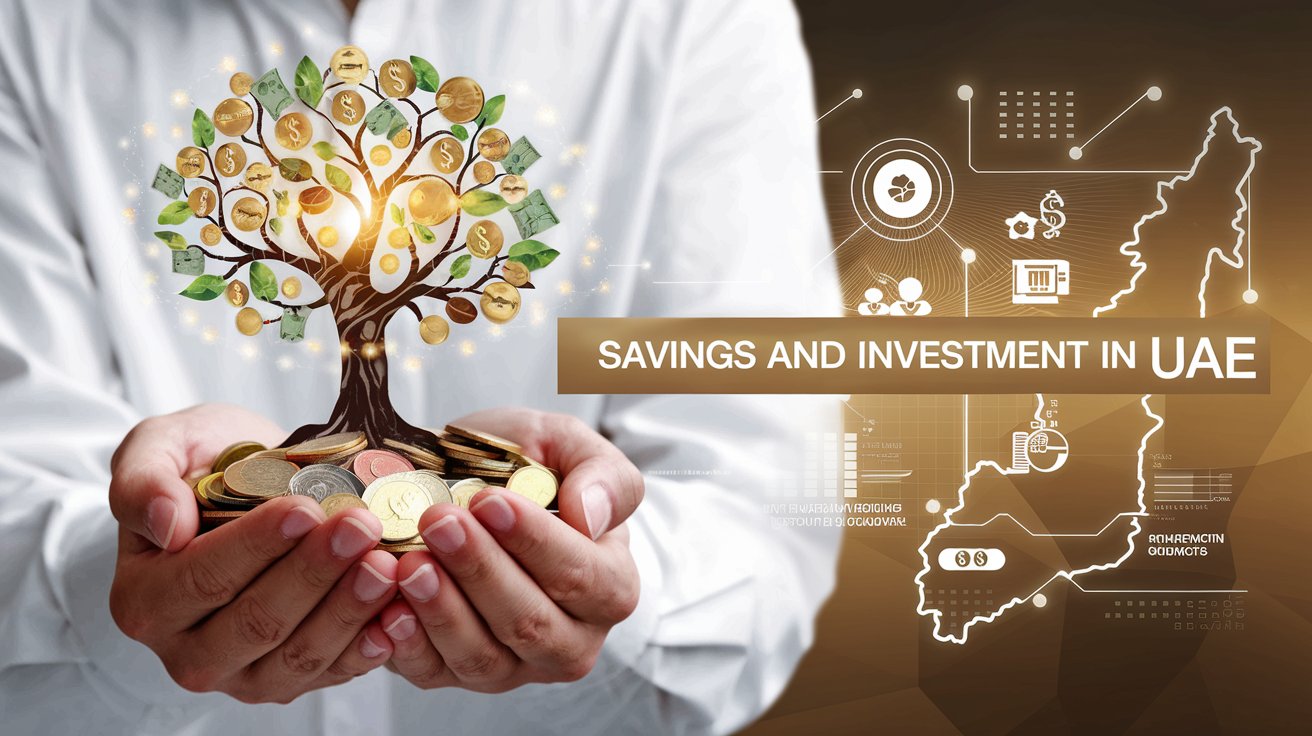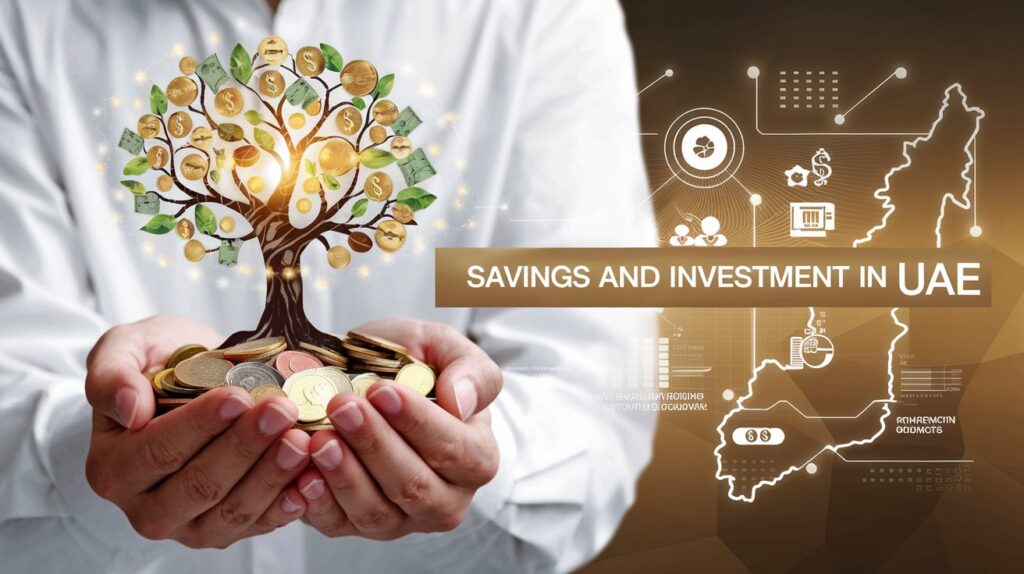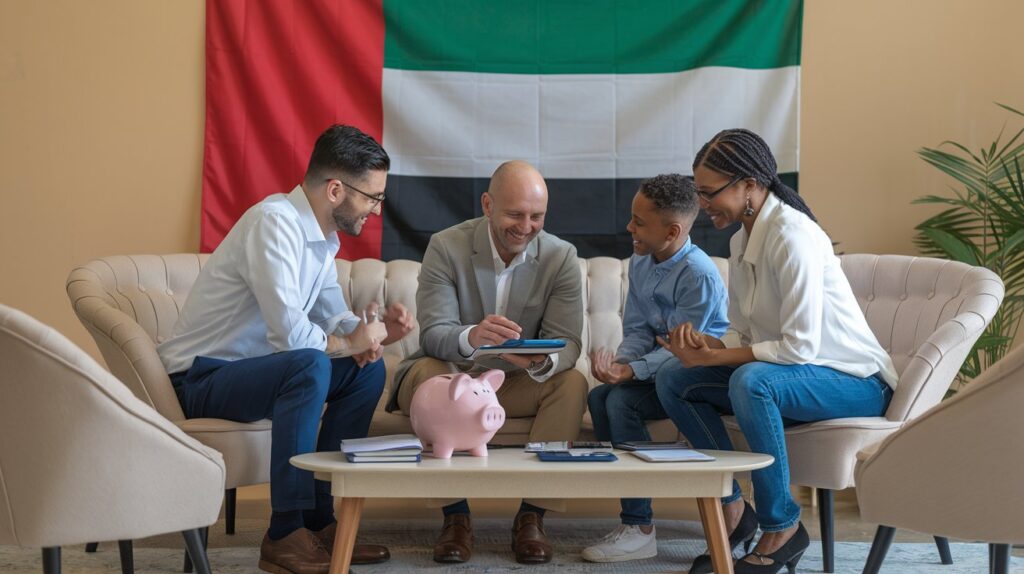<!-- Google tag (gtag.js) --> <script async src="https://www.googletagmanager.com/gtag/js?id=G-FNVKYB7G4T"></script> <script> window.dataLayer = window.dataLayer || []; function gtag(){dataLayer.push(arguments);} gtag('js', new Date()); gtag('config', 'G-FNVKYB7G4T'); </script>

“Savings and Investment in UAE“ refers to strategies for managing and growing personal or business finances in the United Arab Emirates. Economically booming, with varied investment opportunities and tax-free income sources, the UAE possesses a one-of-a-kind setup for money-making. Whether a resident or an expat, it is pertinent to learn more, since these strategies could offer you those helpful tips in making the most of your resources. This paper contains a compilation of actionable advice, frequently asked questions, and important considerations when customizing your financial plan in the UAE.

Table of Contents
Why Are Savings and Investment in UAE are Important?
Those high wages and the luxurious lifestyle enjoyed in Savings and Investment in UAE are benefits that can make a person spend more than they would need to if they are less cautious about their financial planning. Making savings and investments are important parts of the approach as they ensure some financial security and future stability in the long term in the next way:
1. Building an Emergency Fund:
Life is unpredictable and there are incidences that may come like a bolt from the blue: a medical emergency, job change or loss and urgent repairs. When you have an emergency fund, you should certainly be prepared to cover those costs without burdening your credit.
2. Preparing for Retirement:
There is no government retirement pensions plan for expatriates in the UAE. This means you must make your retirement plan by saving and investing from an early stage. This will give you enough cash that will help you maintain your lifestyle at the time when you stop working.
3. Achieving Financial Independence:
This is the condition achieved through saving and investing rightly to a point where you do not depend on regular income before accomplishing certain financial goals. Financial independence gives you the freedom to follow your preferences in decision making rather than based on the available funds.
4. Funding Major Expenses:
One may be planning to finance significantly important expenditures like further studies of children, another property investment, or even business start-up. This is an opportunity for one to save and also put in investments, and certainly, this will pile up enough amount of money for these.
5. Protecting Against Unforeseen Circumstances:
Any emergency can occur, after all. Moreover, one’s personal finances can get severely affected through the fluctuations in price levels, the state of markets, or changing economic circumstances. Through efficient saving and investing, the individual can put up a barrier against such risks.

Top 7 Strategies on Savings and Investment in UAE
There are various reliable ways that you can use to save your money at Savings and Investment in UAE. You can even increase your savings. Below are seven methods that you can use to increase the wealth in your case:
1. Set Clear Financial Goals
Before you even start, it is important to define your financial goals. You must lay down your goals, both short-term (a car or a trip, etc.) and long-term (retirement or a house purchase). This makes possible the prioritization of every goal with a designated quantity of saving targeted for each.
2. Track Your Expenses
Monitoring how you spend your money is at the heart of being able to tighten your belt where possible. You can use apps like YNAB (You Need A Budget) or Mint, tools that can trace and categorize all your expenses, allowing you to clearly see where you have been able to spend unnecessarily, and thereby reduce all such sectors. This reduction of unusual expenses will add it to your savings.
3. Open a High-Interest Savings Account
Find the best banks offering the highest interests on savings accounts. A high-interest account will help save your money passively until it grows with the time. In addition, choose from accounts that do not require a monthly maintenance fee so as not to diminish your savings for charges.
4. Utilize Salary Deductions
A more important way to really secure your consistent investments is to automate savings. Use the mechanisms of salary deductions to automate that little bit from each and every check to be instantly transferred to savings or into some form of investment account. It is not a matter of taking it seriously as the most important thing in life.
5. Avoid Unnecessary Debt
While credit cards have their target users, there are possible reasons to lead to unintended debt because credit lines seem inviting to spend once they are not managed very well. However, proper management will discourage debts: “Do not exceed credit card purchases and meet in full the balances each month on avoidable interests.” You want to have a debt-free life and, in addition, will retain a good savings and investment climate.
6. Leverage Cashback and Rewards Programs
For qualifying purchases, many credit card companies offer rewards programs: such as cashback on everyday purchases such as groceries or fuel. Keep these buys in mind when spending them for everyday expenses, because that’s where the rewards come from, which will pay for future expenses or get stowed away in your savings account. Make certain that the credit card balance is fully paid. The final payment will keep you free from paying any interest charges.
7. Create a Monthly Budget
Budgeting is among the best ways if you want to keep track of your finances. That said, the 50/30/20 formula is perfect to use in this case-per the rule, 50% is kept for needs (rent, utilities), 30% is for wants (entertainment, dining out), and 20% is for savings. This framework ensures consistency in saving and controlling expenses in a cost-effective manner.
Savings and Investment in UAE Opportunities
Saving efficiently is key to achieving financial stability, and there are various strategies you can adopt to grow your Savings and Investment in UAE. Here are seven practical ways to help you build wealth:
1. Set Clear Financial Goals
Having financial goals is everything before you start saving. Start with short-term goals like buying a car or taking a vacation; the longer-term ones would be such things as retirement or property acquisition. Allocate specific amounts of money to all these goals so that you always know what to save for and how to achieve it.
2. Track Your Expenses
If you are keeping an eye on your spending, you will know where all your money is going. Download apps like You Need A Budget or mint to help compartmentalize your expenses as well as to be able to track them to analyze where you would be able to cut down unnecessary costs.
3. Open a High-Interest Savings Account
Maybe you will pass through various banks to find the one which interests you with the savings accounts it offers. High interest, savings accounts can be said to facilitate accumulation over time. “Maintenance fees where they are low and waived translate into realized savings.
4. Utilize Salary Deductions
Automate your savings if it is difficult to contribute funds consistently. By setting up salary deductions, a portion of your income direct deposits as per your own jobs into your own savings or investment accounts. Saving has to become a way of doing things without thinking about initial expenditures.
5. Avoid Unnecessary Debt
Although credit cards provide many conveniences, they also bring with them the opportunity to accumulate debt that you do not want. A consumer should maintain a tight rein over the use of his credit cards while doing his best to keep his credit balance entirely paid out every month, and hence avoid interest rates. This ensures efficient saving and investment ability.
6. Leverage Cashback and Rewards Programs
Many credit cards often allow cashback or rewards against everyday purchasing, such as groceries or fuel. You can earn future spending adjustments or mixed into a savings account by swimming strategically through every-day expense using them. Make sure when the time comes to pay the balance in full so that you don’t get caught in interest debts.
7. Create a Monthly Budget
The monthly budget is the most effective technique of monetary management. Abide by the 50/30/20 principle, which impounds 50% of the amount into the needs that are rent, electricity, and so forth; 30% is for the wants, that is, things like your entertainment and non-ending dinner dates; and 20% goes to your savings account. This method is structured so that you save a certain amount each time so you can also save while managing expenses more wisely.

People Also Ask: About Savings and Investment in UAE
1. How Much Should I Save Monthly in the UAE?
It is recommended to save at least 20% of your income. Adjust this percentage based on your financial goals and expenses.
2. What Is the Best Bank for Savings in the UAE?
Top banks include Emirates NBD, Abu Dhabi Commercial Bank (ADCB), and Mashreq Bank. Compare their offerings to find the best fit for your needs.
3. Is Real Estate a Good Investment in the UAE?
Yes, the UAE’s real estate market is lucrative, especially for long-term investors. Conduct thorough research before purchasing.
4. How Can Expats Invest in the UAE?
Expats can explore options like National Bonds, mutual funds, and real estate. Ensure compliance with local regulations.
5. What Are Sharia-Compliant Investments?
Sharia-compliant investments adhere to Islamic principles, avoiding interest-based or unethical practices. Options include Sukuk (Islamic bonds) and halal stocks.

Conclusion
In Savings and Investment in UAE, the road to financial security and the path to wealth is paved by the concepts of savings and investment. Long-term prosperity can be realized by matching high-return opportunities with clear goals and managing costs wisely. Whether you’re new to the region or a long-time resident, the strategies outlined in this article will assist you in making well-informed decisions. Start planning today and get to the bright financial future with the help of experts from Bricks Consultancy.
